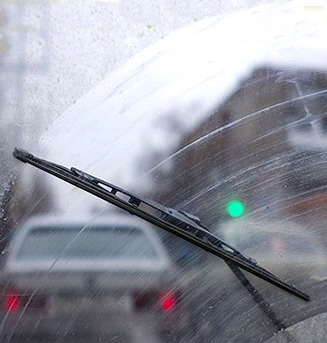The Right Oil for the Season (Engine Oil Viscosity)
August 26, 2022
As the temperatures plunge, certain types of engine oil may not flow as easily as they did when it was warmer. Makes sense, doesn't it? Just like molasses gets thicker as the temperature goes down, engine oil does the same thing. So, maybe you're wondering if you have to change your oil as the seasons change so it's just the right thickness to lubricate your engine parts.
How well engine oil flows is called its viscosity. There are different types of oil—some that have just one viscosity and others called "multigrade" oils. Here's the difference.
A single viscosity oil will flow better when it's hot but not as well when it's cold. A multigrade oil is engineered so that its flow properties at cold temperatures are different than they are at warm temperatures. In other words, a multigrade oil can start out in colder temperatures acting like a thinner oil and then behave like a thicker oil when it's warm. That's a pretty cool trick and it's why multigrade engine oil is used in nearly all vehicles. Your vehicle's manufacturer has the correct viscosity of oil for your particular model included in the owner's manual.
Another choice you have to make when it comes to engine oil is whether you use conventional oil, synthetic oil or a blend of the two. Synthetic oils have some advantages over conventional, such as resisting breakdown better and withstanding higher temperatures.
Check with your service advisor to see which viscosity and type of oil is recommended for your vehicle. It's important that in cold weather, the oil flows through your engine at the right thickness so that parts are being properly lubricated. That will make sure you'll get good fuel economy and performance, no matter what the temperature is.
Star Lube Centerton
550 W Centerton Blvd
Centerton, Arkansas 72719
479-795-1060
https://www.starlubecenterton.com
Need Service?
More articles from Star Lube & Auto Repair

Star Lube Centerton Brake Service for Safe Stopping in Centerton
February 22, 2026
Let's talk about something critical for all Centerton drivers: your brakes. Your vehicle is heavy, and it takes a lot of muscle to bring it and your passengers to a safe stop so everything needs to be in good working order. Here's an explanation on how your disc brakes work: The wheel hub keeps ... More

Power Steering Pump Replacement
February 15, 2026
When youre driving and you hear a squeal or groan when you turn, it may be a sign your power steering pump is on its last legs. The same is true if you feel your steering is slipping or doesnt respond to your hands like it used to. Precise, responsive steering is, of course, important when it ... More

Refresh Your Brakes (Brake Fluid Exchange)
February 8, 2026
Brakes are one of your vehicle's most important safety components, and you may have noticed that they don't stop as surely as they used to. Maybe it takes you applying a little more pressure to them than before, or perhaps you get the feeling that they're not stopping you as quickly. Those could... More









